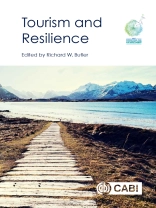This is the first book to address the concept of resilience and its specific application and relevance to tourism, in particular tourism destinations. Resilience relates to the ability of organisms, communities, ecosystems and populations to withstand the impacts of external forces while retaining their integrity and ability to continue functioning. It is particularly applicable to tourism destinations and attractions which are exposed to the potentially harmful and sometimes severe effects of tourism development and visitation, but which also can experience increased resilience from the economic benefits of tourism.
Phenomena such as destination communities, wildlife populations and ecosystems are discussed, as well as the ability of places and communities to use tourism and its infrastructure to recover from disasters such as tsunamis, earthquakes, unrest and disease. This book:
· Compares the relevance of resilience to sustainability
· Contains contributions from many of the leading international authors
· Brings together varying viewpoints of both conceptual and applied issues
· Includes example case studies from Whistler, western Canada; Sri Lanka; Purnululu National Park, Australia; and the remote Pitcairn Island in the Pacific
Tourism and Resilience is relevant for researchers, students and practitioners in tourism and related fields such as development studies, geography, sociology, anthropology, economics and business/management.
Over de auteur
Richard Butler was educated at Nottingham University and the University of Glasgow (Ph D Geography 1973), and spent thirty years at the University of Western Ontario in Canada as Professor and Chairman of the Department of Geography, and then the University of Surrey, where he was Professor of Tourism from 1997 to 2005. He is currently Emeritus Professor of International Tourism in the Strathclyde Business School, University of Strathclyde, Glasgow. He has published a large number of journal articles, fourteen books on tourism and many chapters in other books. His fields of interest are the development process of tourist destinations the impacts of tourism, carrying capacity and sustainability, and tourism in remote areas and islands.












